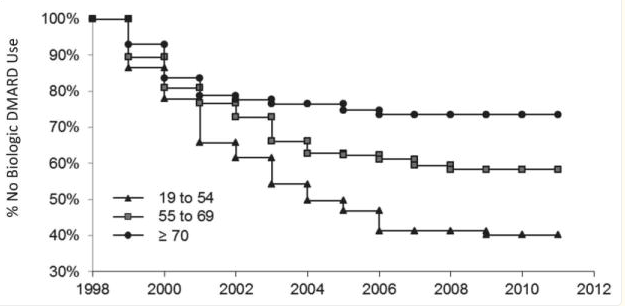Factors Affecting Biologic Use in Rheumatoid Arthritis Save

A San Francisco Rheumatoid Arthritis Panel cohort survey between 1999–2011, showed numerous sociodemographic, disease, and health characteristics that influenced the initiation of treatment with biologic agents for rheumatoid arthritis (RA).
The University of California, San Francisco Rheumatoid Arthritis Panel Study was the source of data, primarily collected by a structured annual phone survey.
The study included 527 RA patients in 1999, and 229 persons (44%) had received biologic therapies by 2011.
An increased probability of initiating biologic agents was seen with:
age <70 years (HR 19–54 years 1.89 and HR for ages 55–69 years 1.25)
hispanic ethnicity (HR 2.02)
household income ≥$30,000/year (HR 1.61)
married or with a partner (HR 1.39)
rural residence (HR 1.96
Lower odds of biologic therapy included having no (HR 0.18) or only 1–4 rheumatology visits in the year prior and living in an area with ≥1 federally qualified health centers (HR 0.63).
Age, income, social factors and residence significantly influence the use of more aggressive (and expensive) therapies in RA patients.
Biologic use based on Age











If you are a health practitioner, you may Login/Register to comment.
Due to the nature of these comment forums, only health practitioners are allowed to comment at this time.